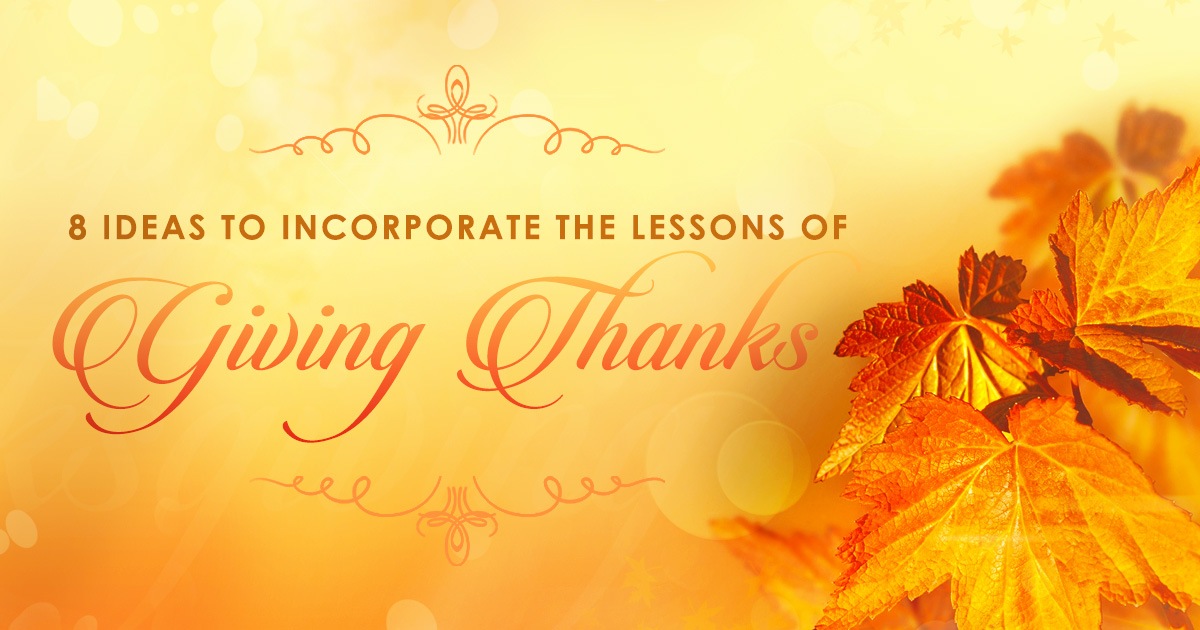Thanksgiving seems to ushers in the holiday season, and rightly so. From it to Advent to Christmastime to Epiphany (and we can event count in Lent and Easter) the calendar is regulated around the revelation that Philippians 2: 6-7 testifies that Jesus, “Who, being in very nature God, did not consider equality with God something to be used to his own advantage; rather, he made himself nothing by taking the very nature of a servant, being made in human likeness.” It is a humbling to begin our pilgrimage every year with a holiday that is anchored in God’s providence and good favor. Unlike the other moments celebrated from the root of Scripture, Thanksgiving reminds us about the roots of America and God’s guiding hand. More and more, we need to incorporate proper thanks to God for all we have and all we are, lest we forget and possibly forgotten (like the 10 northern tribes of Israel in exile). Here are eight ways to consider applying the lesson of giving thanks in your congregation.
8 Ideas to Incorporate the Lessons of Giving Thanks
God Knows We’re Here in America
The establishment of our country and the providence of God to see to the effort of a people yearning to be free is something to be rallied behind, not in overt pageantry nor acceptance of those who sinned against whole people groups, but we should remember those who came to worship the living God in communities where the church and a Christian worldview, as we call it now, was not dismissed nor subjugated by any crown. So, what to do? Remember some of the stories and share them. A Puritan’s Mind offers some thoughts as a start.
Uncover the Prayers of the Puritans
What a rich place to delve into! The Valley of Vision is a treasure trove of devotions and thoughts that provide a long shadow of influence since the 1600s. Consider getting the book (or read portions here) and praying through them in your services. You may also find it helpful to read them in your private devotions since many are directed to ministers. These readings will give a richer lens on the life and work of the Puritans, and how God shaped their community during a desperate but hopeful time. Here’s an example titled “Oh God, My Exceeding Joy”:
Singing thy praises uplifts my heart,
for thou art a fountain of delight,
and dost bless the soul that joys in thee.
But because of my heart’s rebellion
I cannot always praise thee as I ought;
Yet I will at all times rest myself in
thy excellences, goodness, and loving-kindness.
Thou art in Jesus the object of inexpressible joy,
and I take exceeding pleasure in the thought
of thee.
But Lord, I am sometimes thy enemy;
my nature revolts and wanders from thee.
Popcorn Blessings
As you likely know, popcorn is one of the legendary stories of that first Thanksgiving. Why not use it to tell the story of God’s good providence? The winter was about to settle in on the Pilgrims and it’s through friendship and humility on both sides–Wampanoag and colonist–that kept a repeat of Jamestown from happening in Plymouth. They still had many deaths and other hardships, but the mutual kindness, neighbor to neighbor, helped ensure hope for a future. So, even though popcorn was likely not part of the first Thanksgiving of 1621 (since the popcorn story surfaced in a retelling 200 years later), we can use it as a way of giving thanks into the story of God’s blessing on a people who took great risks to find freedom of worship which we know was their primary hope.
Remember Lincoln
Thanksgiving only became a national holiday in America under Abraham Lincoln in 1863, with the union and confederacy deep into civil war. Here is the first portion of this might proclamation: “The year that is drawing towards its close, has been filled with the blessings of fruitful fields and healthful skies. To these bounties, which are so constantly enjoyed that we are prone to forget the source from which they come, others have been added, which are of so extraordinary a nature, that they cannot fail to penetrate and soften even the heart which is habitually insensible to the ever watchful providence of Almighty God.” The last is even more powerful:
I do therefore invite my fellow citizens in every part of the United States, and also those who are at sea and those who are sojourning in foreign lands, to set apart and observe the last Thursday of November next, as a day of Thanksgiving and Praise to our beneficent Father who dwelleth in the Heavens. And I recommend to them that while offering up the ascriptions justly due to Him for such singular deliverances and blessings, they do also, with humble penitence for our national perverseness and disobedience, commend to His tender care all those who have become widows, orphans, mourners or sufferers in the lamentable civil strife in which we are unavoidably engaged, and fervently implore the interposition of the Almighty Hand to heal the wounds of the nation and to restore it as soon as may be consistent with the Divine purposes to the full enjoyment of peace, harmony, tranquillity and Union.
How appropriate are Lincoln’s words even now, in such a politically and morally divided country of today? Forward this to your Sunday School teachers, read it from the pulpit, and let’s all pray for, “the Almighty Hand to heal the wounds of the nation.”
At My Church I’m Thankful for…
Designate a prominent place to celebrate community and God’s provisions. Perhaps dedicate a time of reflection for giving thanks in the service and collect “At my church I’m thankful for…” cards during the offering. You can pair this with a series of testimonials from families, something you may already be doing. If you have time, you may also consider making the thankful cards more like bands that you can staple together in a chain of various fall colored paper. That way the chain of community thanks is even more represented.
I Will Give Thanks
The Bible is full, especially in the Psalms, of giving thanks to God over and over again: “I will give thanks to the Lord because of his righteousness,” (Ps. 7:17); I will give thanks to you, Lord, with all my heart; I will tell of all your wonderful deeds (Ps. 9:1); Give thanks to the Lord, for he is good; his love endures forever (Ps. 106:1). Giving thanks creates a posture in us to receive God’s grace and recognize our undeserved favor. Let us use this heightened time of thanksgiving to teach our congregations again about the deep love of God. I remember my grandfather, a great man but sinner through and through, crying through the Thanksgiving dinner prayer as three generations sat around his large dining room table. He knew he didn’t deserve God’s blessings, and only through His immeasurable grace was he welcome into His good providence. And so too, all of us.
Reflect on Hymns of Thanksgiving
We are so accustomed to contemporary worship, it’s can be refreshing to return to older hymns. Alister Begg often does this. It tends to enrich our understanding and take us out of our expectations. For example, Charles Wesley writes:
The sacred cup of saving grace
I will with thanks receive,
And all His promises embrace,
And to His glory live.
My vows I will to His great name
Before His people pay,
And all I have, and all I am,
Upon His altar lay. (“What Shall I Render to My God?”)
Or this one by William Dix:
To Thee, O Lord, our hearts we raise
In hymns of adoration,
To Thee bring sacrifice of praise
With shouts of exultation.
Bright robes of gold the fields adorn,
The hills with joy are ringing,
The valleys stand so thick with corn
That even they are singing.
And now, on this our festal day,
Thy bounteous hand confessing,
Upon Thine altar, Lord, we lay
The firstfruits of Thy blessing.
By Thee all human souls are led
With gifts of grace supernal;
Thou, who gives us our daily bread,
Give us the bread eternal. (“To Thee, O Lord, Our Hearts We Raise”)
There a many more. Cyber Hymnal is a great resource (though the site is somewhat dated) for finding old hymns and a bit of biography about the author and history of each hymn.
Usher in the New Year (Early)
Many churches will usher in Advent on November 27, just days after Thanksgiving. If your church hasn’t traditionally celebrated Advent, read more about it. Similar to Rosh Hashanah on the Jewish calendar (Oct. 2 this year), Advent is the start of the Christian new year. It begins our preparation for the coming of Jesus in Bethlehem. What a great testimony if our churches recognized this starting point to making all things new? Maybe you’re like me. I’ve always seen the festivities of Dec. 31/Jan. 1 as shallow and the celebration of nothing. What the calendar to a people who don’t know the God who stepped into time? But, Advent looks to this hope and discovery and promise: Immanuel, God with us. That’s reason to be giving thanks!
Giving thanks expresses gratitude. In the case of God, our whole being and ability is wrapped and wrapped again in his good grace. Romans 12:1 says it best: “Therefore, I urge you, brothers and sisters, in view of God’s mercy, to offer your bodies as a living sacrifice, holy and pleasing to God—this is your true and proper worship.”

The post 8 Ideas to Incorporate the Lessons of Giving Thanks appeared first on churchrelevance.com.

No comments:
Post a Comment